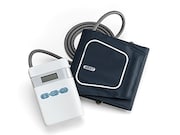Higher systolic blood pressure measured with ambulatory monitoring tied to cardiovascular events, mortality
MONDAY, Aug. 19, 2019 (HealthDay News) — Among African-Americans, higher daytime and nighttime systolic blood pressure (SBP) is associated with an increased risk for cardiovascular disease (CVD) events and all-cause mortality independent of blood pressure (BP) levels measured in the clinic, according to a study published online Aug. 14 in JAMA Cardiology.
Yuichiro Yano, M.D., Ph.D., from Duke University in Durham, North Carolina, and colleagues used data from 1,034 African-American participants (mean age, 58.9 years; 32.6 percent male) in the Jackson Heart Study who completed ambulatory BP monitoring at baseline (Sept. 26, 2000, to March 31, 2004).
The researchers found that the mean daytime SBP/diastolic BP (DBP) was 129.4/77.6 mm Hg, and the mean nighttime SBP/DBP was 121.3/68.4 mm Hg. During a median of 12.5 years of follow-up for CVD and 14.8 years for all-cause mortality, there were 113 CVD events and 194 deaths. Adjusting for in-clinic SBP and DBP, for each standard deviation (SD) higher level of BP, the hazard ratios (HRs) for CVD events were 1.53 (95 percent confidence interval [CI], 1.24 to 1.88) for daytime SBP (per 13.5 mm Hg), 1.48 (95 percent CI, 1.22 to 1.80) for nighttime SBP (per 15.5 mm Hg), 1.25 (95 percent CI, 1.02 to 1.51) for daytime DBP (per 9.3 mm Hg), and 1.30 (95 percent CI, 1.06 to 1.59) for nighttime DBP (per 9.5 mm Hg). There was an association between nighttime SBP and all-cause mortality (HR per 1-SD higher level, 1.24; 95 percent CI, 1.06 to 1.45), but there was no association for daytime SBP (HR, 1.13; 95 percent CI, 0.97 to 1.33) and either daytime (HR, 0.95; 95 percent CI, 0.81 to 1.10) or nighttime (HR, 1.06; 95 percent CI, 0.90 to 1.24) DBP.
“Measurement of daytime and nighttime BP using ambulatory monitoring during a 24-hour period may help identify African-American individuals who have an increased cardiovascular disease risk,” the authors write.
Abstract/Full Text (subscription or payment may be required)
Copyright © 2019 HealthDay. All rights reserved.








